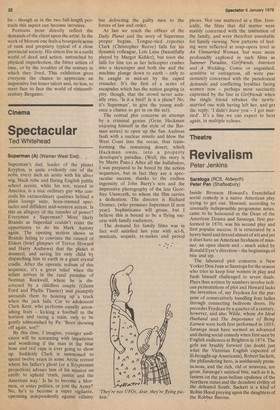Cinema
Spectacular
Ted Whitehead
Superman (A) (Warner West End) Superman's dad, leader of the planet Krypton, is quite evidently one of the nobs, every inch an aristo with his silver wig, black robe and fluting English public school accent, while his son, reared in America, is a nice ordinary guy who conceals his extraordinary qualities behind a plain lounge suite, horn-rimmed spectacles and diffident mid-western accent. Is this an allegory of the transfer of power? Everyman a Superman? More likely Brando as Superdad couldn't resist the opportunity to do his Mark Antony again. The opening section shows us Brand° failing to convince the council of Elders (brief glimpses of Trevor Howard and Hairy Andrews) that the planet is doomed, and saving his only child by dispatching him to earth in a giant crystal cradle. After the operatic tedium of this sequence, it's a great relief when the infant arrives in the rural paradise of Norman Rockwell, where he is discovered by a childless couple (Glenn Ford and Phyllis Thaster) and promptly astounds them by hoisting up a truck when the jack fails. Cut to adolescent Clark Kent, who performs equally astonishing feats — kicking a football to the horizon and racing a train, only to be gently admonished by Pa: 'Been showing off again, son?'
By this time, I imagine, younger audiences will be screaming with impatience and wondering if the man in the blue hose and red cape is ever going to show up. Suddenly Clark is summoned to spend twelve years in some Arctic retreat where his father's ghost (or a Kryptonian projection) advises him of his mission on earth: to uphold 'truth, justice and the American way.' Is he to become a Mormon, or enter politics, or join the Army? No, he's to become a super vigilante, operating independently against villainy but delivering the guilty men to the forces of law and order.
At last we reach the offices of the Daily Planet and the story of Superman proper begins. Tongue-tied reporter Clark (Christopher Reeve) falls for his dynamic colleague, Lois Lane (beautifully played by Margot Kidder), but soon she falls for him too as her helicopter crashes into a skyscraper and both she and the machine plunge down to earth — only to be caught in mid-air by the caped crusader. It's the first of a series of escapades which has the nation gasping (a pity, though, that the crowd never actually cries, 'Is it a bird? Is it a plane? No, it's Superman', to give the young audience a chance to get in on the act).
The central plot concerns an attempt by a criminal genius (Gene Hackman enjoying himself in the style of the Batman series) to open up the San Andreas fault with a nuclear missile and blow the West Coast into the ocean, thus transforming the remaining desert, which Hackman owns, into a property developer's paradise. (Well, the story is by Mario Puzo.) After all the hullabaloo, I was prepared to be bored by the action sequences, but in fact they are a spectacular success, thanks to the endless ingenuity of John Barry's sets and the impressive photography of the late Georfrey Unsworth, to whom the film carries a dedication. The director is Richard Donner, (who promises Superman II next year). Sophisticates will groan, but I believe this is bound to be a flying success with family audiences.
The demand for family films was in fact well satisfied last year with sci-fi, musicals, sequels, re-makes and period pieces. Not one mattered as a film. Ironically, the films that did matter were mainly concerned with the institution of the family, and were therefore unsuitable for family viewing. New patterns of feeling were reflected at soap-opera level in An Unmarried Woman, but were more profoundly explored in such films as Summer Paradise, Girlfriends, Interiors and A Wedding. Comic or anguished, sensitive or outrageous, all were passionately concerned with the paradoxical demands and conflicting loyalties facing women now — perhaps most succinctly expressed by the line in Girlfriends when the single friend rebukes the newlymarried one with having left her, and get the reply: 'I didn't leave you — I got married'. It's a line we can expect to hear again, in multiple echoes.






























 Previous page
Previous page